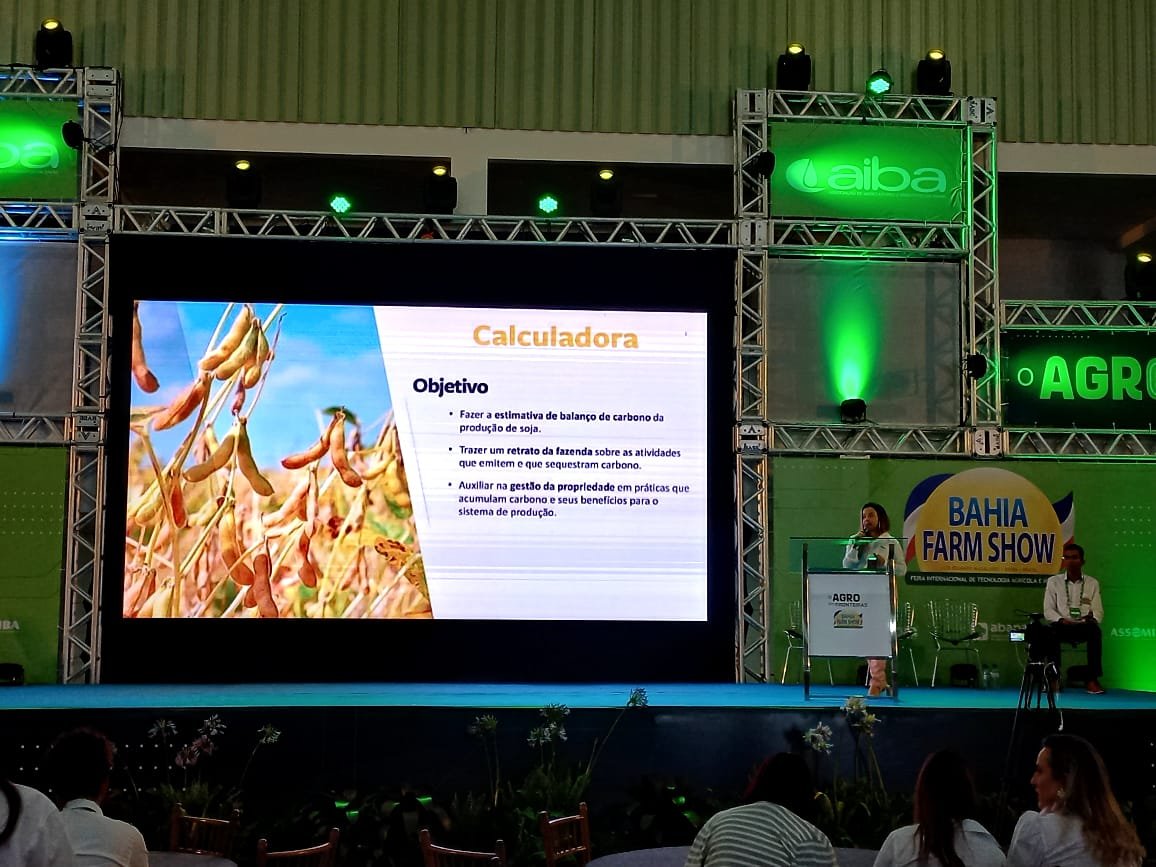Solidaridad Foundation promotes sustainable soy production in Matopiba
The Solidaridad Foundation, a partner of the Land Innovation Fund and the Association of Farmers and Irrigators of Bahia (AIBA), has concluded a project that consolidates its performance as an organization working for best agricultural practices in the soy chain in Western Bahia
With good agricultural practices and proper soil management, soy production has great potential for reducing GHG emissions. Photo: Solidaridad Foundation.
Carried out with support from the Land Innovation Fund and in partnership with the Association of Farmers and Irrigators of Bahia (AIBA), the Solidaridad Foundation’s project Improving the Carbon Balance in Western Bahia has come to an end with the delivery of a methodology to estimate the carbon balance for soy cropping, customized for the characteristics of the Matopiba region, which comprises the states of Maranhão, Tocantins, Piauí and Bahia. The calculator is part of SENAI CIMATEC's Environmental Intelligence and Monitoring System (SIMA) and will be managed by AIBA. Aiming at progressive improvements in the region's carbon balance, the initiative also published the study Carbon Balance for Soy Production in Matopiba and held workshops, lectures, and seminars to broaden the audience for these issues.
The Solidaridad Foundation’s work in Western Bahia shows it is possible to adapt agricultural practices, increase yields, and preserve the Cerrado biome. The Foundation's Director, Rodrigo Castro, reiterates the importance of partnerships to shift paradigms in the sector:
"Our partnership with the Land Innovation Fund is strategic for the Fundação Solidariedade to help expand people’s awareness of the potentials for low-carbon soy farming. In partnership with AIBA, we developed a tool that estimates the carbon balance in soy production, in order to encourage better agricultural practices that make production more resilient and climate responsible. Improving the carbon balance on the farm is important to confront the climate crisis, and is also beneficial to farmers", he says.
For the Land Innovation Fund, the project is a chance to foster the emergence of an innovation landscape for agricultural sustainability in Brazil. "The Solidaridad Foundation’s project has increased the understanding of the on-farm benefits of adopting sustainable, low-carbon agricultural practices, benefiting both farms and the environment," says the Director of the Land Innovation Fund, Carlos E. Quintela. "Furthermore, the data collected in Western Bahia is part of a study with major implications for public policymaking to promote low-carbon agricultural practices that mitigate climate change," he added.
CARBON CALCULATOR
The methodology was developed by a working group with 68 members, including local partners and experts. Participation by farmers during the project was essential to gather information about their production systems. In all, almost 300 farmers and their technical staff were visited or contacted, and 58 farms used the calculator in Western Bahia. The Solidaridad Foundation’s Carbon Expert, Camila Santos, highlights the tool's potential and its environmental benefits:
"With this tool, we estimate the carbon balance and identify key activities causing emissions as well as management practices to help capture them. The results can help technicians and farmers in management decisions, like limiting machinery movements to reduce diesel consumption, or cover crops to mulch more organic matter in the soil and improve the entire system, with fewer inputs and greater production resilience, among other benefits," she says.
The carbon calculator was unveiled at the kick-off of the Bahia Farm Show 2023, the largest agricultural fair in the North and Northeast regions. Photo: Solidaridad Foundation.
According to AIBA's Sustainability Manager, Eneas Porto, "the carbon tool is a management tool for farmers, whose direct participation is on-farm evidence that it has caught on and gained adherence. We can see that their grasp on sustainability is broadening, with results in better soil quality, productivity, and water percolation in the soil". The initiative has made a major contribution to sustainability on farms in Western Bahia, promoting both new practices and real involvement.
BEST PRACTICES
Conducted in collaboration with the Institute for Forest and Agriculture Management and Certification (Imaflora), the study Carbon Balance for Soy Production in Matopiba surveyed 50 farms in the region, with a productive area of over 150,000 hectares of soy. After it was published, the Solidaridad Foundation held an online event with important stakeholders in the agriculture and cattle-raising sector to discuss proposals for incentives to the adoption of low-carbon practices. The meeting was attended by 80 people from 45 institutions involved in nine different sectors of the soy chain.
Additionally, to inform more people about the theme with high-quality information, it held six seminars, five lectures, and a workshop in partnership with AIBA. Those gatherings were attended by more than 350 people, including students, technicians, farmers, and companies. Another key partner for the initiative in the region was the Agricultural Cooperative of Western Bahia (Cooproeste), responsible for helping to contact and bring in the farmers. In the vision of Lucas Sousa de Assunção, Cooproeste's Agronomist and Sales Consultant, the initiative has the potential to expand its reach and benefit more locations:
"The partnership with Fundação Solidariedade, Aiba and the Land Innovation Fund has been very good. The project brings direct benefits for farmers, and it would be very worthwhile if it were expanded to other crops in the Western Bahia region. Good practices benefit not only farmers, but the planet too", he stressed.
Besides LIF's support, the project Improving the Carbon Balance in Western Bahia also received funding from the Norwegian Agency for Development Cooperation (Norad), through the Norwegian International Climate and Forest Initiative (NICFI).
EXPANDING ACTIVITIES IN THE MATOPIBA REGION
Through its actions and projects, the Solidaridad Foundation intends to disseminate the use of the carbon balance estimation tool to more farms in Matopiba. With the knowledge acquired during its work in Western Bahia, it is expanding the promotion of low-carbon farming practices to the state of Maranhão, whose project – "Low-carbon Landscapes in Maranhão" – is funded by the German Corporation for International Cooperation (GIZ) and aims to use the carbon calculator on 15 farms in the region.



